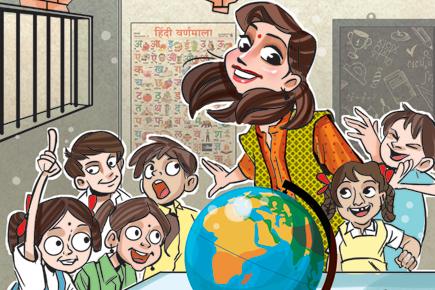This week, a batch of students that I had mentored at the Tata Institute of Social Sciences (TISS), had their convocation ceremony


Illustration/ Ravi Jadhav
 This week, a batch of students that I had mentored at the Tata Institute of Social Sciences (TISS), had their convocation ceremony. They were participants in the Prime Minister's Rural Development Fellowship (PMRDF), coming from all over the country. I had conducted a journalism workshop for 60 Fellows, and edited a book of their reports, with insights from the field, for TISS in 2015. The batch has just graduated with a Master's in Development Practice. (Yes, I have a rich life outside the movies, working with development issues).
This week, a batch of students that I had mentored at the Tata Institute of Social Sciences (TISS), had their convocation ceremony. They were participants in the Prime Minister's Rural Development Fellowship (PMRDF), coming from all over the country. I had conducted a journalism workshop for 60 Fellows, and edited a book of their reports, with insights from the field, for TISS in 2015. The batch has just graduated with a Master's in Development Practice. (Yes, I have a rich life outside the movies, working with development issues).
ADVERTISEMENT
The PMRDF is an amazing exercise in grassroots development, aimed at curbing the Naxalite violence that has been rife in several Indian states over the decades. According to the South Asia Terrorism Portal, terrorism/insurgency-related fatalities across India were 772 in 2016, climbing down from over 5,000 in 2001. On one hand, the government deploys armed security personnel to destroy Maoist cadres. On the other, its Integrated Action Plan has concentrated development plans in 60 'Left-wing extremist districts' in nine states, investing Rs 30 crore per district to bring drinking water, electricity, roads, schools, housing and primary health centres to wean the locals away from the Naxals. Since the violence continued to be widespread, Jairam Ramesh, former Union Rural Development minister, had set up the PMRDF to encourage the youth of India to help find solutions. These Fellows, who were posted for three years in Left-wing extremist districts, were trained to become "catalysts for transformative development". In addition to field experience, they could submit a dissertation, and were paid rather well at Rs 75,000-Rs 90,000 per month during the Fellowship.
The Fellows did wide-ranging projects, dictated by local needs. One of them, Ankush Singh, was posted in Munger, Bihar, where he started a skill development programme, including construction and computer skills. In Meghalaya, he worked on a biofuel programme, involving the mass cultivation of the plant Pongaemia pinnata. In Chhattisgarh's Dantewada district, notorious for its record of violence, Fellow Akash Badave was involved in agriculture, and its killing fields are slowly turning to organic farming. Singh's batchmates have started an NGO, i-Saksham in Jamui, Bihar, where community teachers and children are taught using digital aids, including low-cost tablets, educational videos, animation and applications.
Before joining PMRDF, Singh had a well-paid IT job with Amdocs, an Israeli telecom company, based in Pune. He told me that after he was sent to South Africa and the US on work, he had a job offer in the US of $94,000 or nearly Rs 56 lakh per annum. But he got selected by the PMRDF and had no second thoughts. Many Fellows, he said, now had jobs averaging R12 lakh per annum, some even got R16 lakh per annum. According to Fellow Aditya Tyagi, some Fellows are working for multilateral organizations like the World Bank and UNDP, others have jobs with the central government's rural development programmes like the 'Rurban Mission'; yet others have
joined NGOs.
The PMRDF is a fantastic programme, and I hope it continues, incorporating the Fellows' suggestions, long into the future. Apart from learning so much about India, I am so humbled by these deeply inspiring youngsters and idealists, who have shown in this age of cynicism and facebook activism, that it is possible to change the world, one village at a time. What Jairam Ramesh had called "a leap in the dark" has, in fact, become "a leap into the light."
Singh's mother had despaired when he had given up his high paying job offer in the US to work in rural Indian districts marked by left-wing extremism. "What will I tell people when they ask why you have done this?" she had asked.
Hopefully, she is proud of him today, and doesn't need to answer anyone.
Meenakshi Shedde is South Asia Consultant to the Berlin Film Festival, award-winning critic, curator to festivals worldwide and journalist. Reach her at meenakshishedde@gmail.com.
 Subscribe today by clicking the link and stay updated with the latest news!" Click here!
Subscribe today by clicking the link and stay updated with the latest news!" Click here!







